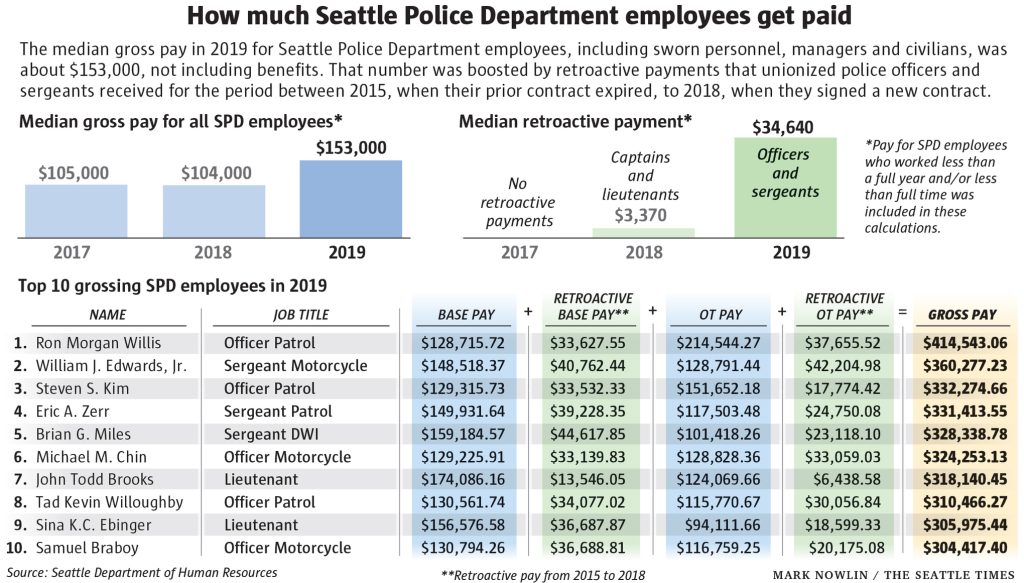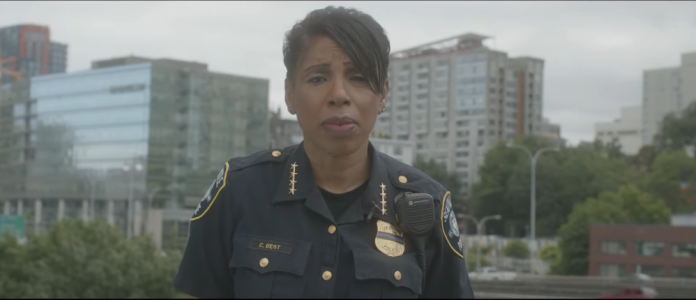Chief Carmen Best announced yesterday she would be resigning effective September 2nd in a message to Seattle Police Department (SPD) employees after conservative radio host Dori Monson leaked the news. Chief Best blamed the Seattle City Council for her early departure, saying she felt personally targeted by their proposal to cut executive pay and fire officers out of seniority order to weed out the worst offenders for excessive force and misconduct.
Earlier in the day, the Seattle City Council voted unanimously to cut the Seattle Police Department’s $409 million budget by 7% or the equivalent of 100 officer positions as part of a Covid-triggered re-balancing package. Many of the cuts likely will be achievable by attrition, but some may need to be layoffs.
Docking the chief’s pay by 40% for the remainder of 2020 had been in the package until Councilmember Lisa Herbold introduced an amendment pulling back the paycut to a modest 6.5% cut (or 2% averaged out over the year). The amendment passed on a 5-2 vote–with only Councilmembers Kshama Sawant and Tammy Morales opposed.
The paycut means Chief Best’s 2020 salary would have worked out to $287,754 had she stayed on all year–this is based on the police chief’s new salary of $275,000 plus the payments she had received on her previous $294,000 salary. The paycuts only apply to 2020, although the council may choose to make them permanent during fall budget deliberations.
Best was the first Black women to lead SPD, which led some commentators, such as former HUD Deputy Secretary Ron Sims and Vox‘s Matt Yglesias, to frame her resignation as a blow to racial justice.
Some protest leaders pushed back on that framing.
“How many Black people in Seattle wanna fill in Matt on how this was a Black-led effort from our Black-led movements have been organizing for MONTHS?” said Kamau Chege, director of the Washington Census Alliance, in a tweet.
Mayor Jenny Durkan and Chief Best have said Deputy Chief Adrian Diaz would act as interim Police Chief after she steps down in September, as confirmed in an email obtained by KOMO News. She said her command team has agreed to continue to serve, adding SPD was “the best department in the country” and “the vast majority of people in Seattle support you.”
Chief Best had vocal support from Black faith leaders in Seattle, who participated in a press conference defending her conduct in June. She also continues to have support within Black Lives Matter King County-Seattle, which released a statement calling her resignation a loss and accusing the Seattle City Council of “performative action” that “forced her out.”
A spiraling police department
Nonetheless, SPD’s performance under her tenure leaves much to be desired when it comes to de-escalation and police accountability. Here’s some of what SPD has been up in the last two and a half months since George Floyd’s murder kicked off daily protests:
- Maced a nine-year old kid;
- Tear-gassed Capitol Hill for more than a week straight, endangering not just protesters but babies in nearby apartment buildings;
- Tear-gassed Councilmember Kshama Sawant;
- Targeted journalists with tear gas, pepper spray, and blast balls;
- Ignored a chemical weapons ban by a federal judge that the Seattle City Council sought to tighten;
- Targeted nurses and medics in uniform while they were offering first aid;
- Abandoned an entire precinct and the surrounding six blocks;
- Refused to respond to emergency calls within those six blocks in a timely fashion contributing to at least one death;
- Wrongly arrested and jailed a British journalist causing an international diplomatic incident and significant embarrassment;
- Issued a far-reaching subpoena demanding major news networks turn over all their raw footage and burn their sources in hopes of tracking down protesters; and
- Never really admitted to doing anything wrong.
Not all, or even most, of SPD’s shortcomings are at Chief Best’s feet, but at the same time, she hasn’t been cooperative with recent reforms and accountability measures being ratcheted up.
For example, Best said she wouldn’t fire police officers out of seniority order despite a loophole in Public Safety Civil Service Commission rules that would clearly permit her to do so and growing calls to get violent cops off the streets. She was also slow to ban the practice of officers obscuring their identification with mourning badges, and even wore one herself at press conferences despite the requests from Councilmembers and members of the public.
This is a department used to getting what it wants and facing very few consequences. The Seattle Police Officers Guild (SPOG) elected a hard-line president (Mike Solan) and board to lead them and their reaction has been to complain to national conservative media of their unfair treatment while painting protesters as an unruly antifa mob that deserves a good whooping. It’s not clear what leverage a Chief of Police has over the guild, but the fact that the MLK County Labor Council expelled SPOG from their ranks in June should weaken their negotiating power a little.
How will Mayor Durkan respond?
As news broke last night, many folks in our feed said Mayor Jenny Durkan’s resignation should be next. Petitions urging Mayor Durkan to resign or face a recall have been circulating and one of them has more than 42,000 signatures.
The Mayor and Chief Best had leaned heavily on each other in recent months as criticism piled up of their handling of protests. In fact, Mayor Durkan even joked that they were contemplating their “Thelma and Louise moment.” Chief Best went ahead and made the plunge into retirement, how long will her partner in crime be behind her?

The job that awaits Mayor Durkan or her replacement is certainly a tough one. The re-balancing package deliberations were dramatic enough, but we’ll do it all over in a couple months with even more money at stake and less room for the excuses about not having enough time.
The issue of excessive compensation is likely to come back in fall budget deliberations. A Seattle Times analysis found that more than 374 SPD employees earned more than $200,000 in annual pay in 2019. The highest paid officer pulled in $214,544 in overtime pay alone for a grand total of $414,543 in gross pay.

Median gross pay for SPD employees ballooned to $153,000 in 2019 thanks to the lucrative union contract they signed in 2018. Negotiated by Mayor Durkan, the contract included both a pay hike, retroactive pay hike, and retroactive overtime payments for the four years police were working with an expired contract.
The other question is how the search for a permanent police chief will proceed in this environment. While Mayor Durkan insists she’s ready to “re-imagine policing,” she and the Seattle City Council do not appear to share a vision for what that would be.
The last time around Mayor Durkan’s search committee settled submitted five candidates to the Mayor and Best was on the list but ranked lowest, according to committee members. The Mayor’s advisers trimmed that list to three outsider candidates, removing Best (a 28-year SPD veteran) from the list. However, a campaign by Black community members and the police guild raised an outcry and catapulted Best back on the list and ultimately pushed Mayor Durkan to select her. A year and a half later, it appears there may have been something to the reservations search committee members had about Best’s commitment to culture change and reform.

Chief’s Best announcement news conference at 11am today should offer hints at how the Durkan administration will take this setback and chart a course forward.
Update: This article has been corrected to state that Chief Best’s salary was only reduced 2% from $294,000 to $287,754 in 2020 based on salary already accrued before the paycut, and the paycut does not apply to 2021 or future years unless City Council takes future action. I also added a percent figure for the cuts to SPD. Additionally, we originally reported the 7% cut to SPD would trigger layoffs, but it turns out SPD’s high attrition rate meant budget cuts were met without layoffs.
Doug Trumm is publisher of The Urbanist. An Urbanist writer since 2015, he dreams of pedestrian streets, bus lanes, and a mass-timber building spree to end our housing crisis. He graduated from the Evans School of Public Policy and Governance at the University of Washington in 2019. He lives in Seattle's Fremont neighborhood and loves to explore the city by foot and by bike.


